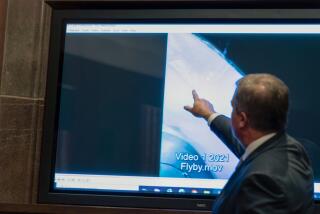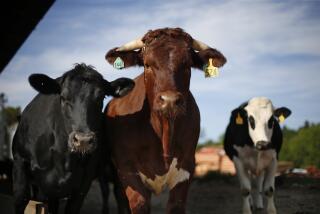NASA Calls Mutant Fruit Worries Tempest in Tomato
Seeking to quell concerns about its shuttle-borne tomato seed experiment, NASA officials called a press conference Friday to insist that tomatoes grown from the seeds are as safe as those from a back-yard garden.
“I’ve never heard of a killer tomato, and I don’t think we’ve got a killer tomato plant here either,” said Alvin L. Young, a science adviser to the Department of Agriculture who has worked with NASA on the nationwide experiment.
The Washington press conference came after The Times reported Friday that NASA chose not to warn participants in the experiment not to eat the tomatoes, despite its receipt of an internal memo, written by a NASA contractor, warning that “radiation-caused mutations could cause the plants to produce toxic fruit.”
The memo, not intended for public distribution, also stated that the research director at Park Seed Co., which supplied NASA with the seeds, “seemed to favor against” eating the tomatoes.
“We have absolutely no evidence to suggest that there is any safety risk associated with these plants above and beyond that of growing tomatoes or other plants in any normal setting,” said Kenneth S. Pedersen, NASA’s associate administrator for external relations. “I would certainly hope that on the basis of the press reports or whatever that schools would not make a decision to withdraw from the program.”
NASA officials said they will send a one-page statement released Friday to all 58,000 teachers who received the seed packets, assuring them that the experiment is safe. They defended the agency’s decision not to issue a warning about eating the tomatoes.
“We are not at all uncomfortable with how we handled it,” Pedersen said. “In fact, we are very comfortable. We feel we did a very responsible job.” NASA officials said Friday that they have distributed more than 120,000 kits of tomato seeds to teachers across the country over the last several months. Participants range from elementary school pupils to college students.
About 12.5 million seeds were recovered in January by the Space Shuttle Columbia from an 11-ton satellite that was launched into space six years ago by the shuttle Challenger. The experiment is intended to provide students an opportunity to study the effects of long-term space exposure on living tissue.
Robert W. Brown, director of NASA’s educational affairs division, said at the press conference that the tomato flap has not led to “significant numbers” of program dropouts, but he did not provide specific numbers.
“This program will affect millions of teachers and students collectively, and it is inevitable that there will be some people who have some concerns and say . . . ‘we don’t want to participate,’ ” Brown said. “When you are dealing with numbers that large, it is inevitable that you will have some of those kinds of concerns.”
In Los Angeles, school officials said Friday it was too early to know how teachers and students will react; most schools were closed for spring break. Richard Boolootian, chairman of the science department at the private Mirman School for Gifted Children, said his classes “are going to stick with the experiment,” but education officials at the Barnsdall Art Park said they have dropped out for good.
“With children it is always better to be safe than sorry,” said Richard Stretz, educational coordinator at the city-run park. “We are interested in nurturing and not doing anything that would jeopardize children.”






